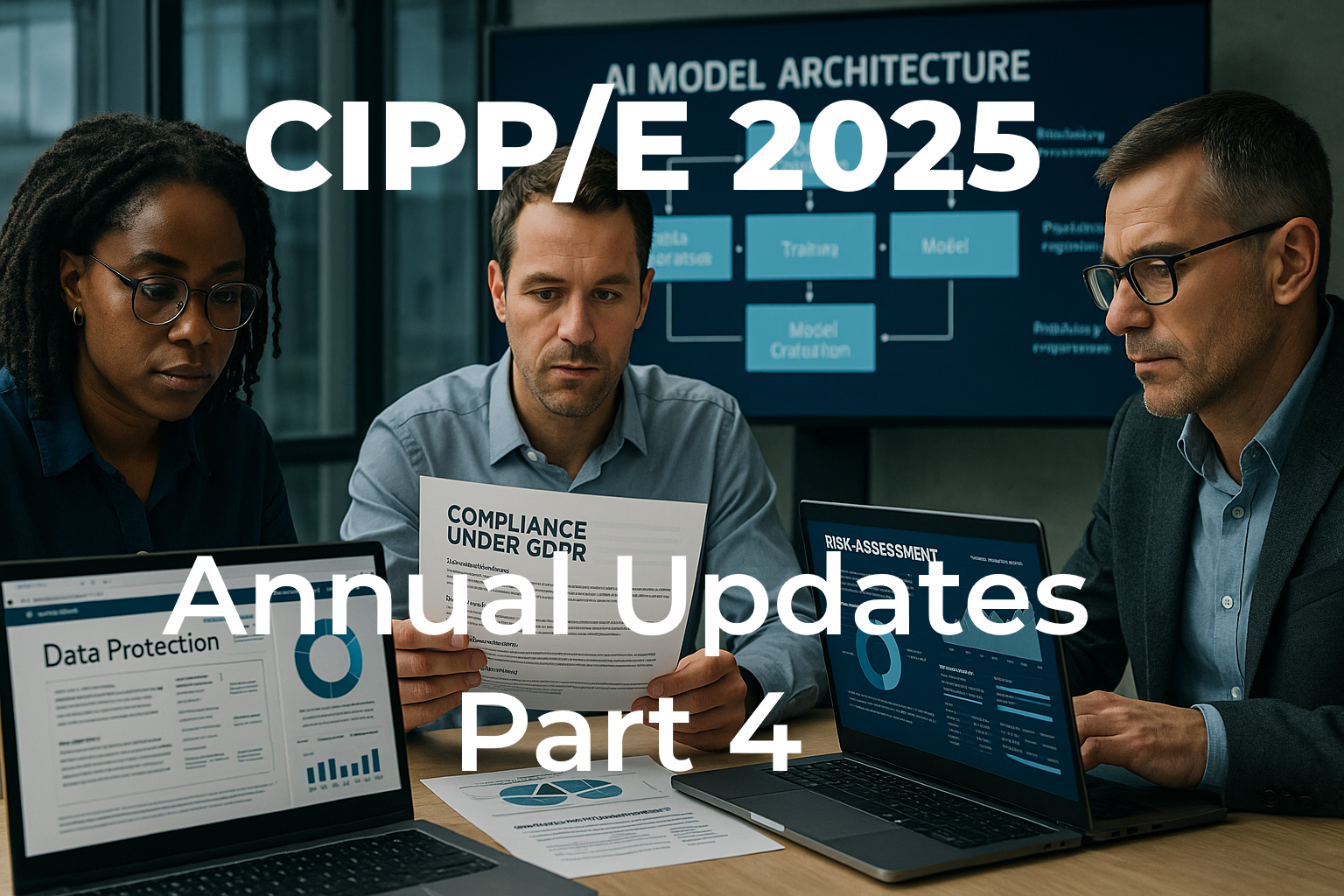The Growing Intersection of AI and Data Protection
Artificial Intelligence technologies now underpin processes from healthcare diagnostics to automated loan approvals. These systems process large volumes of personal data, often in ways not easily understood by users or even developers. This complexity creates novel risks around profiling, discrimination, and lack of transparency.
Under the GDPR, AI-driven processing is subject to the same regulatory standards as other forms of data handling. However, AI presents heightened challenges for compliance with key legal principles. The 2025 CIPP/E revision incorporates new material to address these developments, ensuring privacy professionals remain equipped to handle AI-specific concerns.
Applying GDPR Principles to AI
To maintain GDPR compliance, AI systems must adhere to foundational data protection principles throughout the lifecycle of development and deployment.
- Lawfulness, fairness, and transparency: Data subjects must be clearly informed about how their personal data is collected, used, and processed by AI models.
- Purpose limitation: AI systems should only use personal data for specified, lawful purposes. Reuse for other tasks requires a compatible legal basis.
- Data minimisation: Developers should avoid excessive data collection during model training and inference.
- Accuracy: AI outputs must be based on reliable, up-to-date data to reduce the risk of incorrect decisions.
- Storage limitation: Personal data must not be retained beyond what is necessary for the original purpose.
- Integrity and confidentiality: Strong security controls must be applied to protect data in all AI processing stages.
These principles are non-negotiable. Developers must consider them not only at deployment but also during initial design and data selection.
Frameworks That Help Operationalise GDPR in AI
Organizations can use established ethical and operational frameworks to support GDPR compliance for AI systems. These frameworks help translate legal obligations into practical, repeatable actions.
OECD AI Principles
The Organisation for Economic Co-operation and Development (OECD) issued a set of principles designed to guide AI development worldwide. These principles include inclusive growth, human-centred values, transparency, robustness, and accountability.
Each of these supports GDPR's broader ethical foundation. For example, transparency aligns with GDPR’s emphasis on informed consent and data subject rights, while robustness relates to security by design.
NIST AI Risk Management Framework (AI RMF)
The U.S. National Institute of Standards and Technology developed the AI RMF to manage AI risks in a structured, scalable manner. It comprises four primary functions:
- Govern: Define responsibilities, establish policies, and ensure accountability.
- Map: Document the AI system’s context, goals, and potential risks.
- Measure: Evaluate performance metrics, check for bias, and assess system reliability.
- Manage: Implement controls, monitor performance, and refine procedures.
By aligning with these functions, organizations can demonstrate data protection by design and by default, as required by Article 25 of the GDPR.
Practical Steps for GDPR-Compliant AI
Ensuring GDPR compliance for AI systems involves proactive design and operational safeguards. Organizations should start with data protection impact assessments (DPIAs), particularly when AI makes automated decisions with legal or significant effects. DPIAs help identify and mitigate risks early.
Developers should also design for explainability, enabling end users and regulators to understand how decisions are made. When full transparency is not technically feasible, human oversight mechanisms must be built in, especially for high-risk applications.
Pseudonymization or anonymization techniques can reduce data sensitivity while retaining utility for training and testing. Additionally, maintaining audit trails of model decisions strengthens accountability and facilitates regulatory reviews.
Transparency, fairness, and accountability are not merely best practices; they are embedded within the GDPR's legal architecture and essential for lawful AI processing.
Looking Ahead – The EU AI Act
Although distinct from the GDPR, the EU AI Act complements it by establishing comprehensive, binding rules for AI governance across the European Union. In force since August 1, 2024, the Act adopts a risk-based approach that categorizes AI systems according to their potential impact on fundamental rights, safety, and the rule of law.
High-risk AI systems, including those used in recruitment, education, healthcare, critical infrastructure, and law enforcement, must meet strict obligations. These include mandatory conformity assessments, robust documentation, human oversight mechanisms, and post-market monitoring. General-purpose AI systems are now subject to transparency requirements regarding their capabilities, training data, limitations, and intended uses, with further rules applicable since August 2, 2025.
The AI Act and the GDPR are designed to operate in parallel. They reinforce each other’s safeguards for data protection, accountability, and ethical design. Privacy professionals must understand how both frameworks interact to ensure lawful and responsible AI deployment within the EU.
How We Updated the CIPP/E Courseware
To reflect these regulatory advancements, the CIPP/E Prep Suite now includes a dedicated articles on GDPR compliance for AI systems.
This section explains how to apply each GDPR principle during AI development, deployment, and post-deployment phases. It also introduces learners to key external frameworks, such as the OECD AI Principles and the NIST AI RMF, illustrating their practical use in risk mitigation.
Finally, the course offers a preview of the EU AI Act, helping professionals prepare for future legal obligations. Updated practice questions allow learners to apply their knowledge to realistic AI scenarios, enhancing exam readiness and professional competence.



